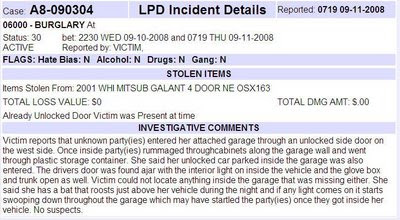I received an anonymous letter while I was away. I feel it needs an immediate response, and this is the best way I can think of to do so, thus I am breaking my normal practice of not blogging at work, and not blogging twice in the same day. It begins like this:
"Dear Chief:
I am a public official and therefore cannot sign this letter. However, I wanted you to know that as a citizen it is absolutely abhorrent to me that the police are promoting and assisting MTV in filming arrests and our officers in the line of duty. I suspect that it takes some coordination and planning with your office, which seems particularly inappropriate."
The letter goes on at length to question my actions in allowing a production crew from the MTV show Busted to accompany our officers. It was copied to the Mayor's office, the chair of the City Council, and the Lincoln Journal Star. I would gladly respond directly to the sender regarding all the questions, were it not for the fact that the author is unknown.
I have been contacted on many occasions by "reality" TV shows, and always rejected their proposals. When the company that produces Busted telephoned, I was prepared to do the same thing, but I hesitated due to the nice work of the representative that phoned. She overnighted two episodes on disc to me, and I crawled the web doing my own research. The following day, much to my own surprise, I was convinced that this would be a worth considering. I was impressed that the episodes, while appealing to a youthful audience, contained positive portrayals of police officers, and essentially had an important message for viewers about the consequences of one's actions.
During the spring semester of 2008, an advanced marketing class at the University of Nebraska School of Journalism produced two exceptional marketing campaigns for the Lincoln Police Department, as their semester project. The campaigns focused on improving our recruitment. Both "teams" noted the importance of our online materials, stressing the need for more interactive and fast-paced material. This is exactly what attracted me to the opportunity to host the production company for a potential episode of Busted. The audience is in our target age demographic, and the episodes show real police officers going about their work in a very human fashion. I thought that these videos were exactly the kind of things the marketing students had been suggesting.
Before I agreed to this project, I played two episodes of Busted at our weekly management staff meeting. Like me, I think everyone was skeptical. But after watching the show, the consensus was strong that this was a project that could benefit us. I still feel that way. I also checked with the administrative aide to the Mayor who is responsible for liaison with the police department. I knew that this was something that should be approved by the Mayor's office, and I sought and received that approval.
There is no secret here. We have nothing to hide, and no reason to be concerned if a TV crew films us working, so long as they are out of harms way and not interfering with our functions. People on the street are doing it all the time with hand-held video cameras and with cell phone cameras. This production crew is experienced in working with several other law enforcement agencies. They know how to keep clear, where they should and should not go, and what they can and cannot do. The officers who have hosted them have reported no problems in this regard.
The Busted crew was on a ride along last week when a critical incident occurred. The anonymous letter implies a relationship between the ride along and the incident. The fact that the crew was along with the officer played no part whatsoever in this tragic event. The crew stayed behind at his vehicle, and the people involved in the incident were entirely unaware of their presence. There was no video footage, but the officer was wearing a wireless microphone that accurately recorded the audio portion of the events in excellent quality. This is a fortunate accident, as this recording will doubtless be probative in the legal proceedings that emerge from the incident.
In response to the other questions posed: two members of the department were assigned as liaisons to the Busted crew, which does it's ride alongs with regular on-duty officers during their shift; no remuneration is given or received by LPD; Busted carries their own insurance; we have both communications and signed agreements on pertinent matters; the officers follow our normal written general orders; no advance law enforcement information is provided to the crew; we exercise no editorial control over their material, and they are on their own to seek or obtain releases from citizens they may film. I hope this answers the questions posed by the anonymous public official who authored the letter.


















